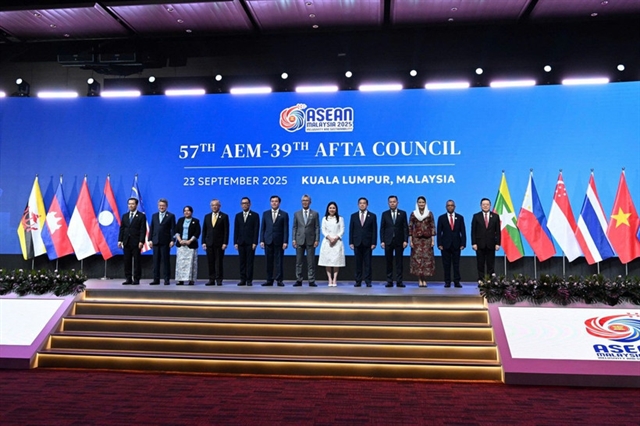 Economy
Economy


|
| Officials at the 57th ASEAN Economic Ministers’ Meeting (AEM). Photomoit.gov.vn |
KUALA LUMPUR – Amidst complex geopolitical and economic fluctuations worldwide, the Association of Southeast Asian Nations (ASEAN) has reaffirmed its strong commitment to regional integration and cooperation.
At the 57th ASEAN Economic Ministers’ Meeting (AEM) on September 23, regional officials discussed and advanced a number of important initiatives aimed at strengthening resilience, ensuring shared prosperity, and upholding the bloc’s central role.
Malaysia’s Investment, Trade and Industry Minister Zafrul Abdul Aziz said that key economic deals such as the Digital Economy Framework Agreement (DEFA) and other upgraded agreements to be sealed next month at the ASEAN Summit are set to help boost intra-regional trade. The DEFA is expected to double ASEAN's digital economy to US$2 trillion by 2030.
The second priority is the upgrade of the ASEAN Trade in Goods Agreement (ATIGA), scheduled for October 2025. The upgraded ATIGA will incorporate new elements to address emerging issues, including remanufactured goods, trade and the environment, and supply chain connectivity. This reflects ASEAN’s commitment to an open, inclusive, and rules-based multilateral trading system, while helping to reduce trade barriers.
Although the share of intra-ASEAN trade has remained relatively stable, these initiatives are expected to boost the overall volume of transactions within the region.
Besides, ministers also discussed many other important initiatives, including the ASEAN framework for integrated semiconductor supply chain, the roadmap for electric vehicles in the bloc, and regional energy cooperation through the ASEAN Power Grid.
Despite forecasts of slowing global growth and rising protectionism, ASEAN remains a bright spot for investment attraction. In 2024, while global foreign direct investment (FDI) fell by 11 per cent, FDI into ASEAN rose by 8 per cent, reflecting strong investor confidence in the region’s potential.
The bloc has consistently underscored its commitment to multilateralism, a rules-based trading system with the World Trade Organisation (WTO) at its core, as well as ASEAN’s centrality and neutrality.
ASEAN ministers will continue discussions with the Office of the US Trade Representative (USTR) on trade and investment relations, including the Trade and Investment Framework Agreement (TIFA). The bloc is also set to sign the upgraded ASEAN – China Free Trade Agreement this October.
In addition, ASEAN has scheduled a dialogue with member economies of the Comprehensive and Progressive Agreement for Trans-Pacific Partnership (CPTPP) on November 20 to explore potential areas of cooperation. The bloc is likewise strengthening ties with partners such as the Gulf Cooperation Council (GCC) and the Republic of Korea through upgrading free trade agreements. VNA/VNS




